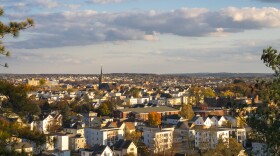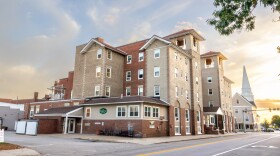A town in Southern New Hampshire is considering banning 55-and-older housing.
Voters in Pelham will decide the issue during a special meeting this Saturday. The ballot question would also impose tighter zoning regulations on 62-plus housing built in town.
The measure first passed in March, but the town is holding a re-vote because town officials failed to follow proper notification requirements leading up to the first vote.
The issue is stirring a lot debate in the community about what to do about the town’s rapidly aging population.
Gretchen Grosky is a reporter for the New Hampshire Union Leader. She covers issues of aging in the state, and she joined NHPR’s Morning Edition to talk about the story.
What is the main argument of supporters?
They don’t like the look. They are very much that this is about density, that these houses are on top of one another and that it’s not pretty to look at. But there has been a very big undercurrent on Facebook pages where the argument has become more pitting one generation against another. In New Hampshire, you’ve seen before will people will say don’t let the young families in because they bring kids in and it raises the tax rate. This is the first time I’ve seen it go the other way, where the proponents of this change have said things on Facebook that bringing more senior citizens will allow them to create a voting bloc, and that voting bloc may go against tax increases for schools. Or they may come to the town and increase our elderly tax exemptions. As one woman put it to me, if you have too many elderly in town they could come forward and say everybody over 62 should not pay taxes in town, although that’s highly unlikely. But those are some of the arguments being used.
Are there many of these 55-plus communities in town now?
There are about 275 units broken up between six or seven different communities. So if you look at that number, it’s about 5 percent of the housing in town is 55 and over.
There’s been some strong pushback on this in town – what are opponents saying?
Obviously, New Hampshire has a rapidly aging population, and opponents are looking at their town itself, where in about 15 years, the number of people over the age of 50 has tripled. So opponents are seeing this as an effort to keep the older people out; that’s their perspective. The proponents don’t necessarily agree with that, but opponents are saying we’d be limiting the housing stock for those that want to stay in town, want to age in town, and want to die in town.
And if this passes, it would still allow 62-plus housing, but it would tighten the zoning rules on those communities. What would change there?
So the Federal Fair Housing Act defines 55-and-over and 62-and-over very differently. For 55-and-over communities, only one person in the house has to be 55. So you can have somebody who’s 55 and married to someone who’s 47, who may have children in their teens. With 62 and older, everyone in the house must be at least 62, so that’s a big restriction right there on who can live there. But the restrictions on what could be built would be changed tremendously under this question, where the minimum amount of land that you can build on increases from 10,000 square feet to 15,000 square feet. So you need a bigger plot of land to build on, but you’d also have to double the buffer zone around the building. So instead of being 50 feet from the line, it now has to be 100 feet from the line. And that’s one of the opponents’ big pushes, is that while the proponents are saying this is about density and having too many houses too close together, opponents are saying even though you’re increasing the minimum amount of land, you’re pushing these homes even closer together that the density is going to get even worse.
And how likely do you think this is to pass?
From what I gather spending a few days in town, I think it will pass.










